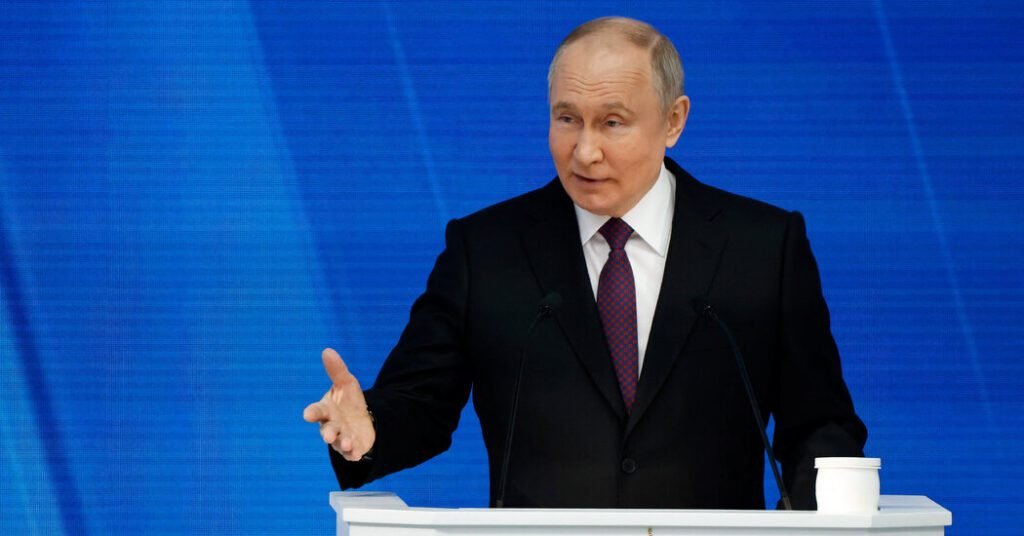President Vladimir V. Putin of Russia said the West faced the prospect of nuclear conflict if it intervened more directly in the war in Ukraine, using an annual address to the nation on Thursday to escalate his threats against Europe and the United States.
Mr Putin said Western countries helping Ukraine to strike Russian soil “must, finally, understand” that “all this really threatens a conflict with the use of nuclear weapons and thereby the destruction of civilization”.
“We also have weapons that can hit targets on their soil,” Mr Putin said. “Don’t they get that?”
The Russian leader cited comments by French President Emmanuel Macron this week that raised the possibility of NATO troops being sent to Ukraine, a scenario the Kremlin said would lead to the “inevitability” of a direct conflict between Russia and western alliance.
The United States and other Western governments have largely tried to distance themselves from Ukrainian strikes on Russian soil, and Mr. Macron’s comments about the possibility of sending Western troops to Ukraine drew swift rebukes from other Western officials, who ruled out such deployments.
Mr Putin, however, considers Russian-held Ukraine to be Russian territory and used Mr Macron’s remarks to bolster his threat. “We remember the fate of those who once sent their troops onto the soil of our country,” Mr Putin said, an apparent reference to the invasions of Hitler and Napoleon. “But now the consequences for potential interlopers will be far more dire.”
Mr Putin’s threats on Thursday came in the opening minutes of his annual State of the Nation address, a major event on the Kremlin calendar in which the president lays out his plans and priorities in a televised address to hundreds of officials, lawmakers and other members of Russia’s ruling elite.
This year, the speech took on added significance because of Russia’s presidential election, scheduled for March 15-17, in which Mr. Putin is running for another six-year term. He is certain to win, but the Kremlin has mounted a concerted publicity campaign ahead of the vote, seeking to use it as a stamp of public approval for Mr Putin’s rule and by extension his war.
The speech came at a geopolitically delicate time: More than two years into the war, Russia has taken the initiative on the battlefield, military aid has stalled in the US Congress and Western governments are at loggerheads over how best to support Ukraine.
At home, Mr. Putin shows no sign of slowing his crackdown on the opposition, which suffered a crushing blow with the death of its jailed leader, Alexei A. Navalny.
“Russia’s political system is one of the foundations of the country’s sovereignty,” Mr Putin said in his speech, suggesting he would continue to crack down on what he saw as Western-organized dissent. “We will not let anyone interfere in our internal affairs.”
Mr Putin has made repeated veiled nuclear threats against the West since launching his full-scale invasion of Ukraine two years ago, seeking to use Russia’s vast nuclear arsenal to deter Europe and the United States from supporting Ukraine.
He had appeared to back off that rhetoric over the past year. But on Thursday, he was back at it, combining his threats with an assertion that he was ready to restart arms control negotiations with the United States — but only, he suggested, if Washington was also prepared to discuss the war in Ukraine .
“Russia is ready for dialogue with the United States on matters of strategic stability,” Mr. Putin said, referring to arms control talks with Washington that had begun shortly before the Russian invasion.
In an apparent reference to Ukraine, Mr Putin added: “This should, of course, only be done as a single complex, including all those aspects that affect the security of our country.”
The White House, for its part, rejected Mr. Putin’s efforts to put the United States at the center of any negotiation over the war in Ukraine. US officials have said the United States has not and will not negotiate on Ukraine’s behalf.
Mr Putin’s threats against the West lasted only a few minutes of a speech that lasted more than two hours. Much of the speech focused on domestic issues such as highways, health care, energy infrastructure and education.
But Mr Putin has framed all these domestic priorities as contingent on the success of his invasion of Ukraine, which the Kremlin refers to as a “special military operation”. He gave no new details about the aims of the war or how it might end, saying only that Russia aimed to “root out Nazism” – a reference to his frequent, false claims that Ukraine is run by “Nazis”.
“I will underline the most important thing,” Mr. Putin said at the end of his speech. “The fulfillment of all targeted plans today directly depends on our soldiers, officers, volunteers — all military personnel who are currently fighting at the front.”
It was a signal that Mr Putin intends to use his re-election in March to portray Russia as committed to war, with the vast majority of the public behind it. Mr Putin has described soldiers and supporters of the war as Russia’s “true elite” and unveiled an education program and other measures aimed at elevating veterans to leadership positions in civilian life.
“They should take leadership roles in the education system, youth upbringing and in public associations, state-owned companies, businesses and state and local government,” Mr Putin said, referring to veterans of his invasion of Ukraine. “They should lead regions, companies and ultimately the biggest domestic projects.”

